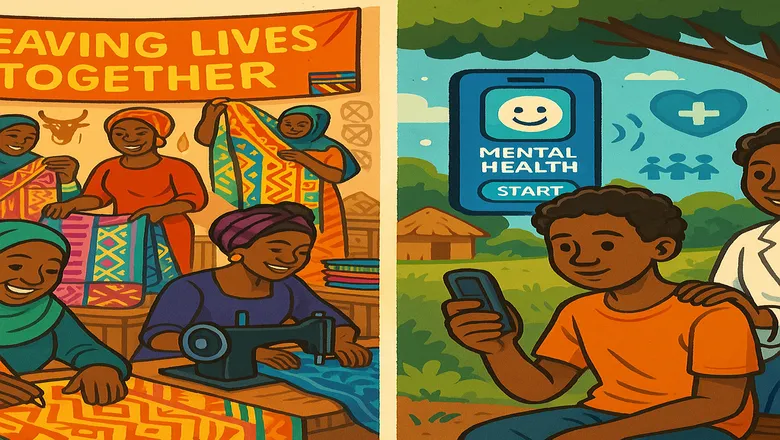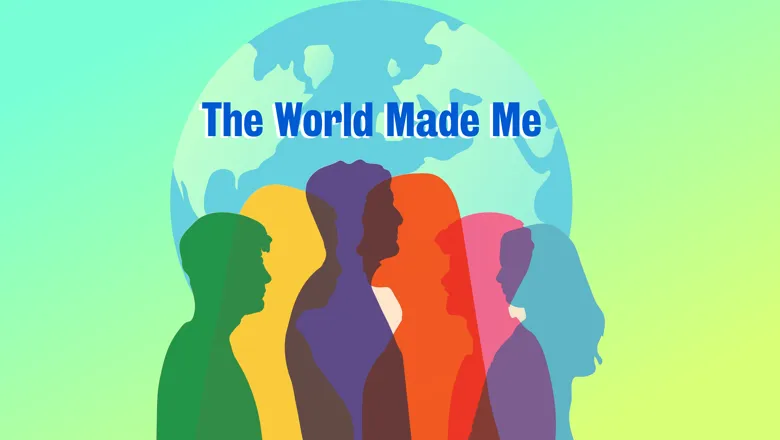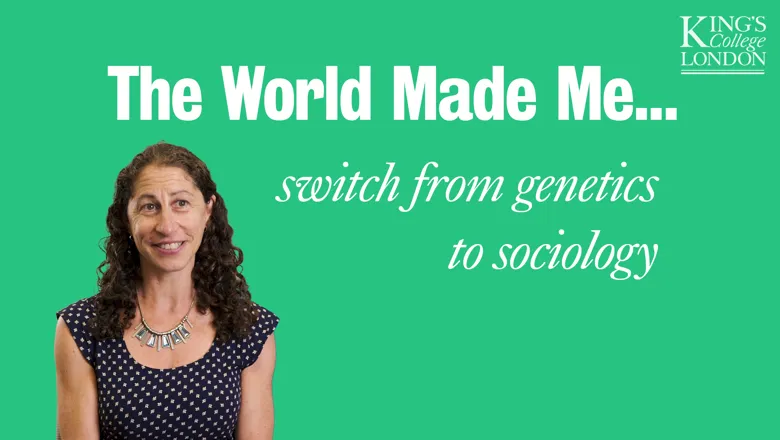
Dr Gabrielle Samuel
Lecturer in Environmental Justice and Health
- Co-Director of SHADE
Research interests
- Biomedical and life sciences
- Environment
- Ethics
Biography
Dr Gabrielle (Gabby) Samuel is a Lecturer in the Department of Global Health & Social Medicine, and an internationally acclaimed social scientist and ethicist who explores the complex intersections of technology, health, and the environment.
Her work critically examines the social and ethical dimensions of emerging technologies, with a particular focus on creating a more sustainable and equitable future. Her primary research investigates the social, ethical and environmental issues associated with genomics, digital health, and the use of big data and artificial intelligence (AI) in the health sector. She primarily draws on qualitative research methods to explore stakeholder perspectives, governance frameworks, and the real-world impacts of technology. Gabby's expertise is built on a multidisciplinary academic foundation that bridges the sciences and social sciences, including a PhD in Biomedical Ethics and Medical Sociology, an MA in Bioethics, and a PhD in Molecular Genetics.
Gabby is actively involved in shaping scholarly discourse through her editorial work as Associate Editor for both the Journal of Empirical Research on Human Research Ethics and the Humanities & Social Sciences Communications journal. She is co-Director of SHADE - a research group and network at the intersection of Sustainability, Health, AI, Digital technologies, and the Environment. She is a visiting scholar at the University of Oxford, a member of the Digital Environmental Sustainability Ethics and Clinical Ethics and Law in Society research groups at Oxford University, and co-Chairs the international Digital Health and Climate Crisis group. She’s a member of the UK Biobank Ethics Advisory Committee. She is a frequent contributor to national and international roundtables, workshops and policy discussions in the area of bioethics, technology, health and the environment.
She supervises both undergraduate and master's dissertations and welcomes PhD students.
Outside of academia, Gabby spends time with her three children, is an exercise enthusiast, (tries to be) a wild swimmer, and is a keen traveller.
Research
- Environment health interactions
- Environmental ethics and environmental justice
- Genomics and biobanking
- Digital health, health apps, AI and big data
- Responsibilities, decision-making and value trade-offs
- Research ethics and research ethics committees
- Ethics and sociology
- Qualitative research
Gabby is particularly interested in the environmental impacts of health technologies, and her research programme explores ethical and governance issues related to this.
She has argued that the moral gaze of technologies should include not only their use, but also where they have come from and where they are disposed, but questions where responsibilities should lie with relation to this. She is particularly interested in decision-making and how values-trade-offs are balanced, and how this relates to moral obligation, responsibility, justice and critical justice scholarship.
Outside of environmental sustainability, her research focuses on the ethical and sociological aspects of innovative, digital health, and genomics technologies and methodologies. Here she explores responsible research and innovation through concepts of participation and reflection. She is particularly interested in notions of trust/trustworthiness.
PhD supervision
Gabby is happy to supervise projects in areas associated with environment/health, big data/AI, genomics, sustainability, bioethics or similar.
Research projects and awards
- 2025-2027. £89,385.21. Co-Leads: Abas M and Samuel G. June 2025-January 2027. Co-producing the first scalable digital intervention for depression in African Countries. One King’s Impact Award. UK
- 2025-2026. £27,707.50. PI Samuel G. coI Shitindo, M. Strengthening Interdisciplinary Global Health Justice Research: Building Publication Capacity in Kenya, British Academy, UK.
- 2024-2028. £1,692,121.00. CoPIs: Lucivero F and Samuel G. Environmentally Sustainable HeAlth Research (SHARE): from ‘tool solutionism’ to a context of sensitive, just, systems-focused and reflexive approach. Wellcome, UK.
- 2024-2025. $50,000.00 PI Shitindo, M. Research Team: Samuel G, Ndyaie, O. Climate Ethics in African Health Research: Building Sustainable Frameworks for Data-Driven Studies. WHO.
- 2024-2025. £48,506.12 CoPIs: Panagiotidou and G. Samuel G. Towards Green(er) AI: Exploring the effect of carbon-trackers in Machine Learning teams. King’s Climate & Sustainability
- 2024. £5000.00 Samuel G. Green Digital Health Tool Impact Accelerator. ESRC.
- 2023-2024. £48,529.80 Samuel G, Lucivero, F. Exploring digital health promises and practices through a sustainability lens. Implementing sustainability in decision-making. King’s Climate and Sustainability Seed Fund
- 2021-2024. £883,623 Blair G (PI), Jirotka M, Knowles B, Lucivero F, Samuel G (CI), Sorrell S, Widdicks K, Webb H. Design Principles and Responsible Innovation for a Sustainable Digital Economy (Paris-DE). ESPRC
- 2021-2027. £246,365 Samuel, G. The environmental sustainability of data-driven health research: a case-study of genomics and digital phenotyping in the UK. Wellcome Research Fellowship
- 2023. £7,200. Samuel G. Global Engagement Partnership Fund, KCL, to cement collaborations with Indian and African colleagues in the area of environmental sustainability.
- 2022-2023. Samuel G. Partner. UKRI Net-Zero Digital Research Infrastructure Scoping.
- 2022-2023. £100,792 Samuel G. Farley, M. Developing a roadmap for environmentally sustainable ultra-low temperature storage in biobanking. MRC
- 2022-2024. £125,164 Rae, C. Selvan, R, Samuel G. Developing environmentally sustainable best practices for human brain imaging. MRC
WHO Consulting work
Gabby does a range of consultancy work for the World Health Organisation around the topic of environmental sustainability and health research
Policy and innovation impact
- Green Digital Health Tool Developed by the SHADE Research Hub at King's College London, this simple tool helps you consider the environmental impacts of a digital health system.
- Graham M and Samuel G. Greening Clinical Trials. Commissioned by the World Health Organisation (soon to be published on the WHO website.
- Samuel G, Williamson P, Fox L, Graham M. Understanding current thinking around carbon emission impact assessment and clinical trials regulation. UKinnovate report. 2023.
- Invited expert speaker on AI and environmental sustainability. Roundtable event, policy connect, carbon connect, All Party working group on data analytics. Portcullis House. 19th October 2023.
- Co-editor of ITU (International Telecommunications Union) AI4EE (Requirements of AI and other Emerging Technologies to Ensure Environmental Efficiency) working group technical report: Driving AI-IoT towards the UN Sustainable Development Goals (SDGs). 2022
- Contribution to Parliamentary Office for Science and Technology (POST) note on environmental impacts of the digital sector. Expert stakeholder contribution, and referenced within report (report can be found here: https://post.parliament.uk/research-briefings/post-pn-0677/). 2022.
Media and public engagement
- Exhibitions:
- Test your digital sustain-ability. The British Academy showcase (July 12-13, 2024)
- Who's Responsible, Bringing the Human to the Artificial, King's (May/June 2023)
- Test your digital sustain-ability, Southampton Science Festival (March 2023). Read about her experience.
- Video appearances:
- Environmental impacts of personalised medicine
- Environmental Impacts with Manufacturing Personalised Medicine
- The environmental impacts of digital technologies
- Podcast appearances:
- The environmental impacts of personalised medicine, University of Oxford. Appeared on podcast as special guest (2024)
- Artificial Intelligence, who cares? Appeared on podcast as an expert in AI and environmental sustainability. BBC Global News (September 2023).
- Co-producer of the podcast series: The ethics of personalised medicine with Dr Rachel Horton, Centre of Personalised Medicine, University of Oxford (2022)
- Documentary appearances:
- Dataiku AI & Us, Fortemusfilms, speaking on the ethical and environmental issues of AI (2022; 2024)
- School outreach:
- Environmental sustainability and digital technologies, one-day school workshop at Cheney School (March 2023)
- Changing our world by re-imagining digital technologies, presenting to 70 students from six local schools, as part of 'Our World', Oxford University (September 2022)
- News interviews:
- Personalized medicine sector needs to consider environmental impact, Genetic Engineering and Biotechnology News. 2022.
- Interviewed by Rob Mackinlay for Information Professional, a membership magazine for the Chartered Institute of Library and Information Professionals. Published as a two-page feature in the magazine. 2022.
Further details
Research

Mental Health & Society research group
Seeking to better understand the socio-political dimensions of mental health and illness in the Global North and South.

King's Climate Research Hub
Studying climate change through the relationship between science, policy and culture.

Reproduction Research Group
Our interdisciplinary group examines the complex social, cultural, and political dimensions of reproduction.

SHADE Research Hub
SHADE sits at the intersection of Sustainability, Health, AI, Digital technologies and the Environment. SHADE is guided by a fundamental question: How should the balance between AI/digital enabled health and planetary health be struck in different areas of the world, and what should be the guiding principles? To address this SHADE promotes interdisciplinary enquiry to understand and make visible sustainable practices situated in specific geographical and societal contexts. Undertaking both normative and solutions based research, SHADE draws on empirical, epistemic and ethical perspectives from philosophy, law, sociology and ethics, as well as from more quantitative approaches such as life cycle sustainability assessment.

Climate & sustainability researchers at King’s
King's researchers working across climate and sustainability

Safe and sustainable diets for a healthy body and mind (SSuDs)
This Research Interest Group on Safe and Sustainable Diets for a Healthy Body And Mind provides a unique opportunity for the King’s research community to address the challenges of safe and sustainable diets across a range of health outcomes

Environmentally Sustainable HeAlth REsearch (SHARE): from ‘tool solutionism’ to a context sensitive, just, systems-focused and reflexive approach
Project investigating wider meanings of environment, sustainability and climate-related discourses in different contexts and countries within health research.
Project status: Starting
News
Over £5m Wellcome funding to digitalise the Friendship Bench
Researchers have been awarded £5.3 million to optimise the digital version of the Friendship Bench mental health intervention for scale in Zimbabwe and beyond.

Championing Mental Health Innovation Across Africa
From Creative Healing in Nigeria to Scalable Digital Therapy

Is Healthcare's Green Push Missing the Bigger Picture? New Study Says Yes
Researchers warn a narrow focus on carbon emissions may obscure deeper environmental and social harms

Public Voices Reveal Complexities in Selling Health and Environment Win-Wins
Study questions simplicity of policymakers’ ‘co-benefits’ approach

King's academics look into crystal ball in new future gazing sci-fi anthology
Researchers in AI from across three different faculties provided expert reflections on energy, healthcare and education in the near future

New research hub launched to explore the intersection of digital technologies, health and the environment
The SHADE research hub has been launched by the School of Global Affairs in partnership with the Ethox Centre in the Nuffield Department of Population Health,...

Science Gallery London announces 'Friday Lates' as part of autumn AI programme
Dive further into the world of AI with performances, special events, a new exhibit and two opportunities for 'after hours' access

Project to explore the environmental sustainability of AI-enabled digital health
A new research project led by Dr Gabrielle Samuel, Lecturer in Environmental Justice and Health at King’s, will examine the sustainability of digital...

Events

Global Health & Social Medicine BA / BSc Information Session - 11 November 2025
Information session for Global Health & Social Medicine BA / BSc
Please note: this event has passed.

All Tomorrow's Futures: scientists meet sci-fi writers to invent possible futures
Immerse yourself in this unique fusion of insights, which will spark discussions about the implications for our future human experience.
Please note: this event has passed.

'The World Made Me': Candid conversations with researchers
Join us for the launch of 'The World Made Me', a new video series from the School of Global Affairs exploring the things that inspired our academics in their...
Please note: this event has passed.
Features
...Switch from Genetics to Sociology
Dr Gabrielle Samuel shares her journey of switching her research career from Genetics to Sociology.

'Places without postcards' highlights impact of climate change around the world
The Faculty of Social Science & Public Policy has created a collection of ‘postcards’ from key places around the globe that tell an important story around...

Health and our environment: is collecting data through new technologies actually helping us?
The collection and analysis of health data brings benefits but at what cost to the environment and others’ health?

Should we consider the environmental and social impacts of the health data we collect?
As part of her outreach activities, Dr Gabrielle Samuel explored the impact of data-driven health research at the Southampton Science Festival.

Research

Mental Health & Society research group
Seeking to better understand the socio-political dimensions of mental health and illness in the Global North and South.

King's Climate Research Hub
Studying climate change through the relationship between science, policy and culture.

Reproduction Research Group
Our interdisciplinary group examines the complex social, cultural, and political dimensions of reproduction.

SHADE Research Hub
SHADE sits at the intersection of Sustainability, Health, AI, Digital technologies and the Environment. SHADE is guided by a fundamental question: How should the balance between AI/digital enabled health and planetary health be struck in different areas of the world, and what should be the guiding principles? To address this SHADE promotes interdisciplinary enquiry to understand and make visible sustainable practices situated in specific geographical and societal contexts. Undertaking both normative and solutions based research, SHADE draws on empirical, epistemic and ethical perspectives from philosophy, law, sociology and ethics, as well as from more quantitative approaches such as life cycle sustainability assessment.

Climate & sustainability researchers at King’s
King's researchers working across climate and sustainability

Safe and sustainable diets for a healthy body and mind (SSuDs)
This Research Interest Group on Safe and Sustainable Diets for a Healthy Body And Mind provides a unique opportunity for the King’s research community to address the challenges of safe and sustainable diets across a range of health outcomes

Environmentally Sustainable HeAlth REsearch (SHARE): from ‘tool solutionism’ to a context sensitive, just, systems-focused and reflexive approach
Project investigating wider meanings of environment, sustainability and climate-related discourses in different contexts and countries within health research.
Project status: Starting
News
Over £5m Wellcome funding to digitalise the Friendship Bench
Researchers have been awarded £5.3 million to optimise the digital version of the Friendship Bench mental health intervention for scale in Zimbabwe and beyond.

Championing Mental Health Innovation Across Africa
From Creative Healing in Nigeria to Scalable Digital Therapy

Is Healthcare's Green Push Missing the Bigger Picture? New Study Says Yes
Researchers warn a narrow focus on carbon emissions may obscure deeper environmental and social harms

Public Voices Reveal Complexities in Selling Health and Environment Win-Wins
Study questions simplicity of policymakers’ ‘co-benefits’ approach

King's academics look into crystal ball in new future gazing sci-fi anthology
Researchers in AI from across three different faculties provided expert reflections on energy, healthcare and education in the near future

New research hub launched to explore the intersection of digital technologies, health and the environment
The SHADE research hub has been launched by the School of Global Affairs in partnership with the Ethox Centre in the Nuffield Department of Population Health,...

Science Gallery London announces 'Friday Lates' as part of autumn AI programme
Dive further into the world of AI with performances, special events, a new exhibit and two opportunities for 'after hours' access

Project to explore the environmental sustainability of AI-enabled digital health
A new research project led by Dr Gabrielle Samuel, Lecturer in Environmental Justice and Health at King’s, will examine the sustainability of digital...

Events

Global Health & Social Medicine BA / BSc Information Session - 11 November 2025
Information session for Global Health & Social Medicine BA / BSc
Please note: this event has passed.

All Tomorrow's Futures: scientists meet sci-fi writers to invent possible futures
Immerse yourself in this unique fusion of insights, which will spark discussions about the implications for our future human experience.
Please note: this event has passed.

'The World Made Me': Candid conversations with researchers
Join us for the launch of 'The World Made Me', a new video series from the School of Global Affairs exploring the things that inspired our academics in their...
Please note: this event has passed.
Features
...Switch from Genetics to Sociology
Dr Gabrielle Samuel shares her journey of switching her research career from Genetics to Sociology.

'Places without postcards' highlights impact of climate change around the world
The Faculty of Social Science & Public Policy has created a collection of ‘postcards’ from key places around the globe that tell an important story around...

Health and our environment: is collecting data through new technologies actually helping us?
The collection and analysis of health data brings benefits but at what cost to the environment and others’ health?

Should we consider the environmental and social impacts of the health data we collect?
As part of her outreach activities, Dr Gabrielle Samuel explored the impact of data-driven health research at the Southampton Science Festival.

